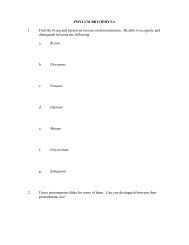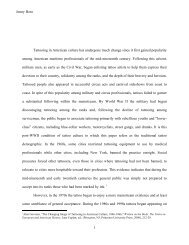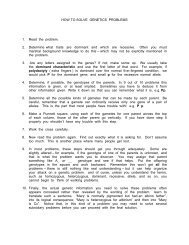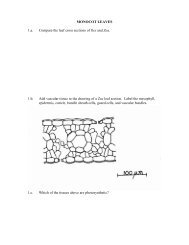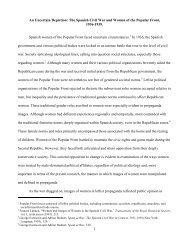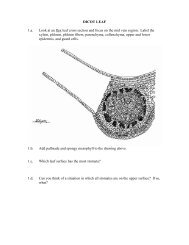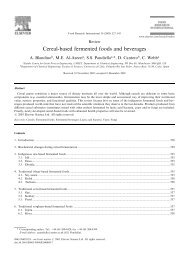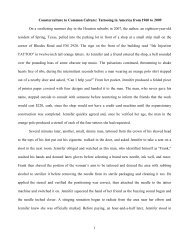Jason Ma<strong>the</strong>nyI hope and expect that by 2050 livestock production will bein global decline, with meat replaced by cleaner, healthier,and more efficient meat substitutes. Each year, 50 billionland animals are raised and killed to feed humanity. Theuse and welfare of <strong>the</strong>se animals has rightly become <strong>the</strong>focus of intense debate. Livestock production destroys wildhabitat, wastes natural resources, contributes to climatechange, and causes many human diseases.Fortunately, <strong>the</strong>re is significant progress in developingtechnologies to replace livestock. Plant-based meatsubstitutes have improved markedly over <strong>the</strong> last decade,and <strong>the</strong>ir market share is now doubling every five years.Thanks to advances in food chemistry, it should soon bepossible to produce plant proteins indistinguishable fromground meat.Producing meat in vitro, in incubators ra<strong>the</strong>r than inlive animals, is technically feasible now using tissueengineering techniques, and research is proceeding tomake it economical. Eventually <strong>the</strong> world’s meat supplycould be produced from a few cells. We should accelerate<strong>the</strong> development of <strong>the</strong>se technologies, so that we candecrease livestock production and its numerous insults tohuman health, environmental quality, and animal welfare.Jason Ma<strong>the</strong>ny is <strong>the</strong> director of New Harvest, a nonprofit researchorganisation working to develop new meat substitutes, including meatproduced in a cell culture ra<strong>the</strong>r than from an animal.www.new-harvest.orgRichie Alford12 Winter 2007 | Volume 2 Issue 4 | www.foodethicscouncil.orgHow should we farmanimals in 2050?Richard LoweIn 2050 meat and dairy products will still be a vital component ina healthy balanced diet for <strong>the</strong> majority of consumers. However,UK production may have significantly reduced and tracts ofgrazing land may have been converted to arable production.Our UK production values will be to farm animalsin a welfare and environmentally friendly mannerto provide safe, traceable wholesome food.Climate change and consequent wea<strong>the</strong>rvolatility will make food supply less certain and, tomitigate this risk, food policy will need to becomemore cautious. There will be greater pressureto maximise agricultural land usage for cerealproduction (and to a lesser extent bio-fuel) andfor countries to ensure <strong>the</strong>y have a secure foodsupply.The big questionThere will be competition for land use and, in <strong>the</strong> UK, this will maintainhigh values for agricultural land. For tracts of lowland grassland in <strong>the</strong> UK,<strong>the</strong> opportunity cost of not putting this grazing land into cereal productionor bio-fuel production may be too great to pass up. Livestock grasslandscould <strong>the</strong>refore become largely restricted to those areas not suitable forarable production.The process of change will be gradual because a significant numberof people farm livestock for reasons o<strong>the</strong>r than making a profit. Butundoubtedly our livestock sector will shrink in size and be divided betweensmall part-time hobby farmers and big, highly efficient meat and dairyunits. The big units, which will be <strong>the</strong> most efficient and environmentallysustainable, will not subsume all <strong>the</strong> smaller units because <strong>the</strong> value ofland in <strong>the</strong> UK will be too high for this to happen.So UK livestock production will be a smaller industry but producing higherquality, welfare friendly and environmentally friendly products.Richard Lowe is Chief Executive of <strong>the</strong> UK <strong>Meat</strong>and Livestock Commission. www.mlc.org.uk<strong>Meat</strong> and dairy products have been an essential aid to human survival anda major driver of development.Over <strong>the</strong> last 50 years, animal productivity in <strong>the</strong> developed world hasincreased significantly in response to demand. This has been at <strong>the</strong> expenseof <strong>the</strong> well-being of <strong>the</strong> animals <strong>the</strong>mselves and also <strong>the</strong> livestock keepers.The environment has been plundered to fuel this production.In addition, <strong>the</strong> gap between rich and poor has grown, both within nationalboundaries and across <strong>the</strong>m. Over-consumption of meat and dairy productshas contributed to significant health concerns.So, in contrast with today, meat and dairy production in 2050 should bebased upon production and marketing systems that are equitable. Laws willensure that <strong>the</strong> poor in our global society have sufficient access to meat anddairy products to achieve a balanced and nutritious diet. The rich will besatisfied with sufficient. In a dominant global market economy, <strong>the</strong> key issuewill be ‘getting <strong>the</strong> price right’: ensuring a just and fair price is paid for allproducts, reflecting social, environmental and production costs.The laws will be based upon good stewardship of <strong>the</strong> earth’s resources,optimising resource use locally, avoiding excess resource movement ordumping (such as stock movements, air pollution, nitrogen leaching, etc).The rights of livestock and <strong>the</strong>ir keepers to a comfortable life will be upheld.Shorter food chains will ensure closer connections between consumers andproducers, stricter control and higher quality.Richie Alford is a member of <strong>the</strong> International Programme Team of Send a Cow, responsible forsupporting <strong>the</strong> programmes in Sou<strong>the</strong>rn Africa. He was born and raised on a dairy farm in Devon.www.sendacow.org.uk
Animals versus<strong>the</strong> environmentIs animal welfare a luxury in <strong>the</strong> fight againstclimate change?Kate Rawlesfinds you can’tsolve a problemwith <strong>the</strong> samethinking thatcaused it…Dr Kate Rawles is anenvironmental philosopher.Having lectured for nineyears in philosophy at <strong>the</strong>University of Lancaster shenow runs courses in OutdoorPhilosophy. She is a memberof <strong>the</strong> Food Ethics Council.kate@outdoorphilosophy.co.ukThere is no such thing as ethics-free farming.Farming by its very nature affects animals ando<strong>the</strong>r living things, ecosystems, and people’shealth and livelihoods. Explicitly or not, itcannot help but take a position on what <strong>the</strong>seeffects and relationships should be – on how<strong>the</strong>se various ‘o<strong>the</strong>rs’ should be treated. Andwe are all party to this in-built ethics, becausewe all eat <strong>the</strong> products of farming.This is not a comfortable place to be. Thedevelopment of husbandry systems thatkeep large numbers of animals in confinedconditions has led inexorably to animal welfareproblems that are systematic ra<strong>the</strong>r than<strong>the</strong> result of occasional bad management.The recent UN Global Environment Outlookreport confirms – again! – that <strong>the</strong> waymodern societies meet <strong>the</strong>ir needs is damaging<strong>the</strong> world’s ecological systems to such adegree that our own future is in jeopardy; andthat <strong>the</strong> way <strong>the</strong>se societies supply <strong>the</strong>mselveswith food is amongst <strong>the</strong> most significantcauses of this ecological mayhem. What’smore, despite our immense impact on animalsand <strong>the</strong> environment, <strong>the</strong> human species hasnot even succeeded in meeting its own basicneeds, with one in five people across <strong>the</strong> worldsuffering malnutrition and about <strong>the</strong> samenumber – in excess of a billion people – lackingclean drinking water.My focus here is on <strong>the</strong> environment andanimal welfare. In particular, I’m concerned byrecent suggestions that animal welfare mayhave to be compromised to help tackle climatechange. Unpacking <strong>the</strong> ethics behind industrialfarming reveals that this is as misplaced astrying to promote traffic calming throughmotorway expansion.Earth auditThe recent United Nations ‘Earth Audit’ oughtto be shocking. It isn’t, but only in <strong>the</strong> sensethat we’ve heard it all before. Like <strong>the</strong> earlierMillennium Ecosystem Assessment (MEA)report, it tells us that <strong>the</strong> speed at whichhumans have used <strong>the</strong> earth’s resources over<strong>the</strong> last two decades has put “humanity’s verysurvival” at risk.1 Key factors in <strong>the</strong> degradationof natural systems that support life on earthinclude habitat change, climate change, invasivespecies, over-exploitation of resources, andpollution such as nitrogen and phosphorus.In all of this, agriculture plays a critical role.More land has been claimed for agriculturein <strong>the</strong> last 60 years than in <strong>the</strong> 18th and 19thcenturies combined. An estimated 24 percent of<strong>the</strong> earth’s land surface is now cultivated. Waterwithdrawals from lakes and rivers have doubledin <strong>the</strong> last 40 years, so humans now use between40 percent and 50 percent of all availablefreshwater running off <strong>the</strong> land. And, of course,<strong>the</strong>re’s climate change. The United NationsFood and Agriculture Organisation argues thatlivestock, primarily cattle, are responsible fornearly one fifth of <strong>the</strong> world’s entire humancaused climate change emissions2 – that’s morethan every plane, train, car, motorbike andskidoo on earth.3In sum, industrialised societies, of which farmingsystems are a key part, are unsustainable. Thisway of living is promoted across <strong>the</strong> worldas what it means to be developed, successful,progressed. Yet this way of living, and <strong>the</strong> values,ethics and worldview that go with it, simplycannot be sustained into <strong>the</strong> future withoutecological collapse. It cannot be shared by 6billion people, let alone <strong>the</strong> projected 9 billion.As <strong>the</strong> WWF Living Planet Report puts it sopowerfully, if everyone enjoyed <strong>the</strong> lifestyle of<strong>the</strong> average Western European, we would needthree planet earths.4So where do we go from here? Steven Hawkinghas seriously suggested searching for o<strong>the</strong>rplanets. Remaining earthbound, one approach isto try to technofix <strong>the</strong> problem – to increaseefficiency and reduce waste to such an extentthat we can retain industrialised lifestyles,and share <strong>the</strong>m, without causing ecologicalmeltdown. Huge efficiency gains can certainlywww.foodethicscouncil.org | Volume 2 Issue 4 | Winter 2007 13



